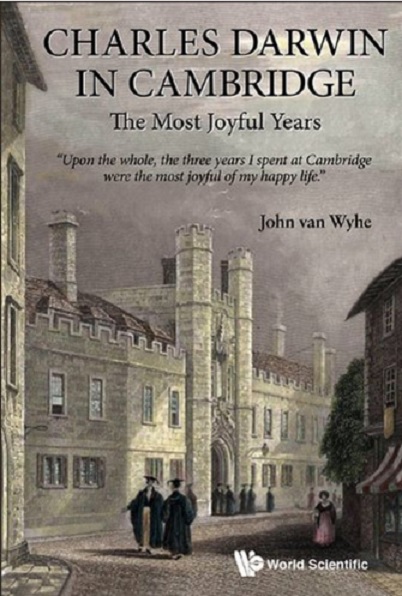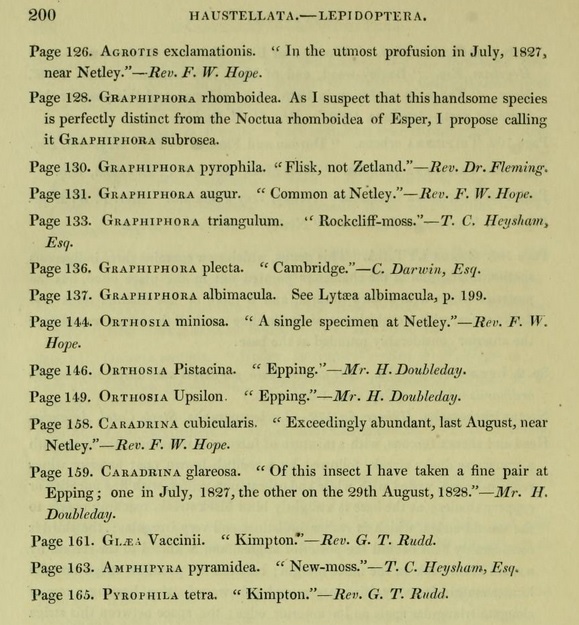Review of
Charles Darwin in Cambridge: The Most Joyful Years by
John van Wyhe
[Singapore: World Scientific, 2014]
"Cambridge" was Charles Darwin's first published word --- the locality datum for a moth, listed in James Stephens's
Illustrations of British entomology, II, 200 [1829].
From Grandfather Erasmus's time until now, generations of the British scientific Royal Family have attended the University,
often taught in its colleges, and in general shaped the place as much as they were shaped by it.
John van Wyhe, founder of the extraordinary
Darwin Online website and among the best
of Darwin's living biographers, has written what will surely be for years to come the definitive account of Charles's sojourn in Christ's
College, with an almost equally interesting description
of the 1909 and 2009 Darwin Centenary Celebrations there
(the latter from the vantage of a key participant).
It must be admitted that Darwin's undergraduate years, save perhaps the last ones, were not especially promising --- less so, it
may be, than even Einstein's. Darwin was not so much a bad student as a mediocre one, exhibiting little interest in his
studies, whiling away time with the horsey set, and avoiding, to the extent possible, all consideration of his projected
ecclesiastical career. (Long-time readers of this blog will recall much of this from the post
"Go It, Charlie!" two years ago.) Had the chap who spent hours
in his room practising "throwing up my gun to my shoulder before a looking glass to see that I threw it
up straight" not proved against all expectation and probability to be one of the most influential thinkers in human
history, details of his undistinguished life at college would be nearly impossible to discover; they are hard to obtain as it is.
Dr. van Wyhe in this volume presents most of the available material, some of it never before published. A collection
of "Student Bills", discovered in 2009, records for each quarter how much C. Darwin owed the
shoeblacker, the bedmaker, the cook, the laundress, the smith ... occasionally even the librarian (though mostly
in his first term). Christ's College in the 1820s was more devoted to pleasure than to work; Dr. van Wyhe (who
clearly has not visited an
upscale American collegiate dormitory recently) marvels at "a more luxurious
lifestyle than any university student nowadays could imagine". Those who wanted academic rigor and intellectual
stimulation could certainly find it, though often outside the parameters of formal
instruction ; Darwin's, however, was the jolly, tipsy, riding-with-the-hounds Oxbridge
immortalised in the next generation's
Adventures of Verdant Green:
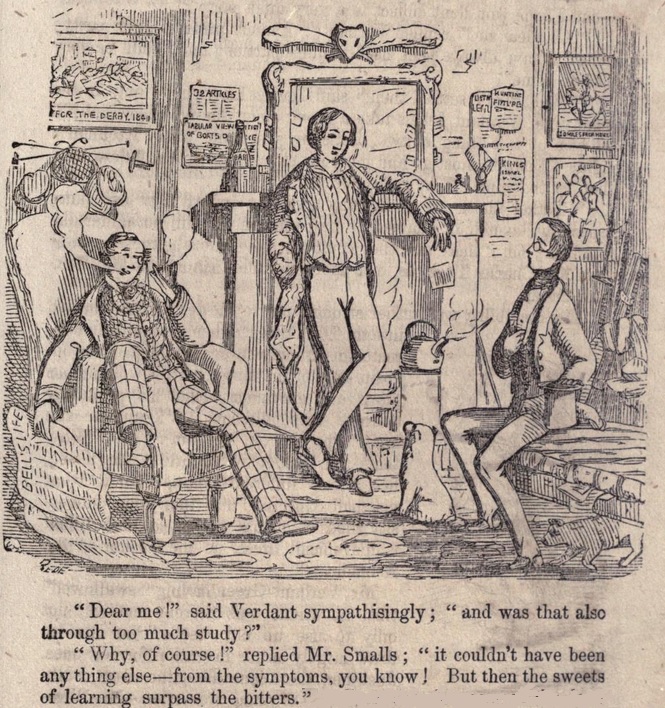
The later, serious, Darwin, was apalled by all this. His son quotes an 1847 letter
to J. D. Hooker (not found, however, in the book under review):
"
Many thanks for your
welcome note from Cambridge, and I am glad you like my Alma Mater,
which I despise heartily as a place of education, but love from many
most pleasant recollections."
Of course, as readers of this blog will recall from
Charles Babbage's account of Trinity life two decades earlier,
the sporting set and the studious were not entirely disjoint, and toward the end of his undergraduate
career Darwin was pulled into the overlap through the charisma of the Rev. John Henslow. Even so,
it is clear that when in old age Darwin referred to his Cambridge interlude with the phrase used
as this book's subtitle, he meant chiefly that he had had a lot of fun -- and that, for Victorians, was
not necessarily an unalloyed good. In his
Autobiography, he puts it thus:
"
Although, as we shall presently see, there were some redeeming features in my life at Cambridge,
my time was sadly wasted there, and worse than wasted. From my passion for shooting and for hunting,
and, when this failed, for riding across country, I got into a sporting set, including some dissipated low-minded
young men. We used often to dine together in the evening, though these dinners often included men of a higher
stamp, and we sometimes drank too much, with jolly singing and playing at cards afterwards. I know that I
ought to feel ashamed of days and evenings thus spent, but as some of my friends were very pleasant, and
we were all in the highest spirits, I cannot help looking back to these times with much pleasure."
When college life finally came to an end, Darwin experienced an episode of depression (not mentioned in
the book under review) which in an 1831
letter to W. D. Fox he jokingly described as "a beautiful provision of nature to make one regret the
less leaving so pleasant a place as Cambridge". Like many a graduate before and since, he had no
desire to enter the "real" world: joining the staff of the
Beagle was essentially a spectacular
delaying tactic.
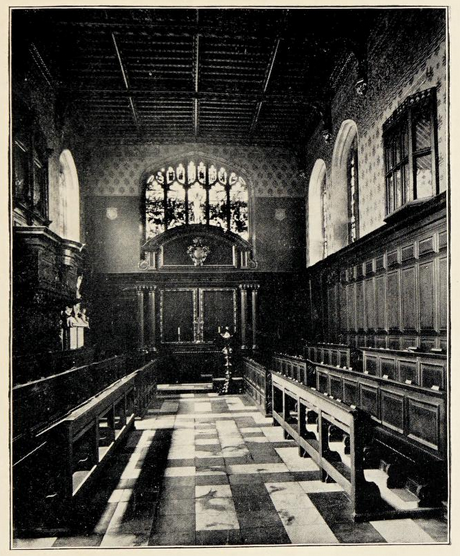
Christ's College Chapel. [From Christ's College by John Peile (London: F. E. Robinson, 1900), Plate V.]
The career threatening him was of course the Anglican priesthood, and, while it is tempting to
think of this as a mere white-collar profession, Georgian Cambridge was still haunted
by the lingering spirit of ancient monasticism.
Dr. van Wyhe highlights the "striking and paradoxical image" of "the man of science who has been
attacked above all others in history as irreligious or dangerous to religion" serving as a lector in Christ's
College Chapel, but nearly
all of the shapers
of the Victorian world came to adulthood in an environment where post-Enlightenment modernity co-existed with
a Christianity the outward forms of which, at least, would have been recognizable to St. Augustine. Christ's
College, with roots in Puritanism, was considered both Low Church and lax in the earlier Nineteenth Century,
but to a time-travelling visitor from contemporary England it would seem like a nest of ultra-Traditionalist
liturgical fanatics, a cult-like place where robed students chanted long, mandatory daily services. Darwin's son
writes:
"
Nor were the ecclesiastical authorities of the College over
strict. I have heard my father tell how at evening chapel the
Dean used to read alternate verses of the Psalms, without
making even a pretence of waiting for the congregation to take
their share. And when the Lesson was a lengthy one, he
would rise and go on with the Canticles after the scholar had
read fifteen or twenty verses."
Religion -- whether the daily liturgical cycle or the personal example of the
saintly Rev. Henslow -- attracted Darwin too mildly to become his calling. Nevertheless,
his last years saw not only Henslow-inspired intellectual growth, but moral growth as well.
In the present account of Darwin's youth as
in all others, the modern reader cannot help being distressed by his extraordinary love of killing things,
a "sporting" trait he shared not only with his social class in general but with most of the pioneering naturalists.
This paradoxical image -- the way to the science of life littered with dead or even vivisected animals -- was a major
component of the revulsion many Victorian physicists felt for the new biology (one of the topics I am supposed to
be exploring in this blog, although I have lately neglected it). It is therefore interesting that according to
his friend J. M. Herbert: "
Before he left
Cambridge he told me that he had made up his mind not to
shoot any more ; that he had had two days' shooting at his
friend's, Mr. Owen of Woodhouse ; and that on the second day,
when going over some of the ground they had beaten on the
day before, he picked up a bird not quite dead, but lingering
from a shot it had received on the previous day ; and that it
had made and left such a painful impression on his mind,
that he could not reconcile it to his conscience to continue
to derive pleasure from a sport which inflicted such cruel
suffering." Darwin's son, quoting this passage, adds:
"
To realise the strength of the feeling that led to this resolve,
we must remember how passionate was his love of sport. We
must recall the boy shooting his first snipe, and trembling
with excitement so that he could hardly reload his gun."
This newfound antipathy to inflicting pain, as most of the standard biographies record,
stayed with Darwin throughout his life, despite the necessity of
collecting specimens ; like his rejection of racial-superiority theories, it is
one of the traits distinguishing Darwin from the Darwinists.
Such positive sides of a great man's character obviously lend themselves to
hagiography, but while the reader of the present book will find little in
it contrary to Darwin's established public image, Dr. van Wyhe is no mythographer.
He challenges a number of cherished beliefs, among them that Darwin occupied the
old rooms of the celebrated natural-theologian William Paley (C. P. Snow, however,
did later occupy Darwin's rooms), that he delayed publication of
The Origin
of Species out of fear of the public's reaction, and that he
dreaded being lumped with anti-Christian activist Robert Taylor as a "devil's chaplain".
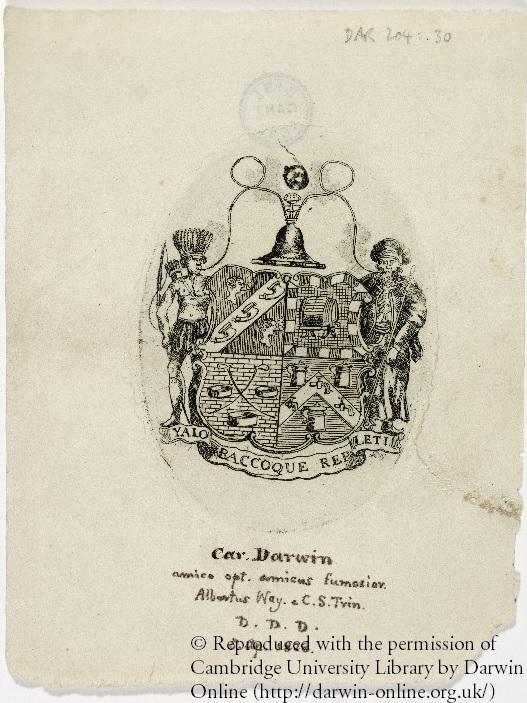
As one would expect from a scholar of Dr. van Wyhe's stature, there are few obvious errors; I spotted only two. The
street called "Maids Causeway" may well have been an excellent place for undergraduates to meet clandestinely with
town girls, but its name almost certainly refers to the former proximity of the Convent of Saint Rhadegund. A more serious
problem (not, however, Dr. van Wyhe's fault) concerns the "
coat of arms" above.
This drawing is by Trinity College undergraduate (and future expert on mediæval
Latin) Albert Way, who presented it to the still "verdant" Charles amico optimo amicus fumosior
("a smokier friend to his best friend"). Dr. van Wyhe's discussion of the coat of arms comes from a
distinguished Cambridge classicist, who translates the motto YALO BACCOQUE REPLETI
as "filled with Yalus and Bacchus", and goes on to say that the Left Supporter (i.e. the figure
standing to the shield's left, or the viewer's right) is Bacchus, the god (and metonym) of wine.
Concerning
the Right Supporter, presumably "Yalus",
the classicist says only that "[t]he figure looks like an American Indian. In Lakota
(the language spoken spoken by the Sioux), yalu-icu means to suck
smoke through a pipe."
Perhaps it does, but one doubts Albert Way knew it.
Hyalo Bacchoque repleti,
to spell the Latin words correctly, means something like "Filled by wine-glass and by wine". The dropped aitches of
hyalus
and
Bacchus both create a mediæval effect and generate a pun on "yellow tobacco".
The Right Supporter is unquestionably an Indian, but the Left Supporter does not look to me at all like Bacchus.
With his turban, sash, and curved dagger, he is almost certainly a Turk: the other ethnic stereotype of a smoker
in the early Nineteenth Century mind. It would be interesting to know what the (in reproduction, at least) blurry
object above the hookah represents: burning charcoal, perhaps?
If some Nineteenth Century jokes are now a bit obscure, many incidents which amuse the Twenty-First
Century reader would have meant nothing in the 1830s. Few moderns will refrain from chuckling when they
learn that in the official list of new students who matriculated on Ash Wednesday 1828 the name "Charles
Darwin" is followed by "Richard Dawkins"! (Dr. van Wyhe provides no further details, but this Dawkins
became a clergyman in Wales and discoverer, in his own church-yard, of
a pit containing the skulls of four-hundred early Mediæval warriors, possibly Vikings
or Saxons slain in the
Battle of Buttington. His son
Sir William Boyd Dawkins was one of the founders of modern archæology, remembered for his role
in proving that humans inhabited Pleistocene Britain.)
[
Note added
2014 Sept. 23: Dr. van Wyhe has kindly sent me a link to
an 1873 letter written by
Darwin in support of Boyd Dawkins's unsuccessful application to the
Woodwardian Chair, previously occupied by Adam Sedgwick.]
Leaving Cambridge was the beginning rather than the end of Darwin's scientific education; the
Beagle
and the Tropics were his true university. In many ways this excellent book tells us less about
Charles Darwin than about an England which, in his own lifetime and partly through his own influence,
would become as distant as any prehistoric epoch. Dr. van Wyhe is to be commended for bringing
this lost world back to life.
